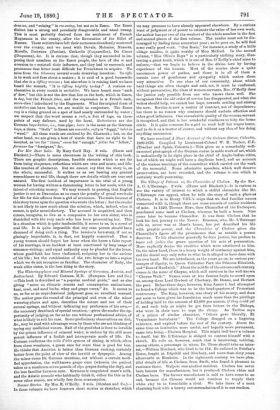A Glossary of the Eases Dialect. By R. S. Charnoek,
Ph.Dr., F.S.A. (Triibner.)—We have been much disappointed with this book. It is wanting in the discrimination of peculiarities of pronuncia- tion and peculiar words. Dr. Charnock should have laid down the phonetic changes in the vowels which distinguish the Essex dialect, and then he might have reduced the number of words in his Glossary, many of which are not other than mispronunciations of common words. The Essex dialect alters the vowels. A becomes i, almost ai; thus " paste " is piste, "ladle" is liclle. Ai is pronounced like the German ai. "Rain" in Essex is something like "Rhine." We know the case of a new-comer to the county being startled and perplexed by his groom asking him :—" I suppose you want the horse to-die?" meaning "to-day." I becomes oi, "pint" is point, " nice " is noir.. ; but before s, is e, "wish" is west. 0 becomes ow, "cold" is cowlcl, it has the sound of the German au ; but ou is pronounced "ow," with an interjected e before the following consonant, thus " four " is changed into " fower." E often becomes a, thus " errand " is errand, and " verse " is warse, for v always becomes w, and" vine" becomes wine, without a vintage. The old Essex clerk, whenever the 132nd Psalm occurs in the Church Service, informs the congregation that he has "wowed a wow." Having laid down these laws, we can dispense with illustrations scattered about in the Glossary and taken haphazard. Why, we may ask, has Dr. Charnock given us in the Glossary noice for" nice," bike for "like," and foine for "fine ?" He should have left these three examples out, or given us point, toight, soight, and every other word that admits of i being pronounced oi. When we know that v becomes w, we do not want worse, wenturesome, worry, wiew in the Glos- sary. If they are to be there, so ought every other word in the dictionary that begins with v. Dr. Charnock's preface is unsatis- factory, because he does not bring out with distinctness the law of vowel-changes. If he had mastered that, it would have simplified his study of the Essex dialect amazingly, and have saved him from some mistakes. He gives clrean for" drain." This is almost certainly erroneous. He must have taken the word from a Yorkshireman whom accident had brought into Essex. In the West Riding "drain" is
dree-an, and "raining" is ree-aning, but not so in Essex. The Essex dialect has a strong and peculiarly disagreeable and nasal twang.
This is most probably derived from the settlement of French Huguenots in the county, after the Revocation of the Edict of Nantes. These settlers have left their surnames abundantly scattered over the county, and we meet with Decals, Melonies, 31ussets, Morella, Pertwees (Parties), Cockrells (Coquerelles), Da Canes (Duquesne), &c. It is curious that, though they succeeded in im- posing their nasaliam on the Essex people, the love of the w and aversion to v resisted their influence, and they had to succumb, and pronounce that letter most difficult for Frenchmen to acquire. We miss from the Glossary several words deserving insertion. To fiffle is to work and fuss about a matter ; it is said of a good housewife that she is a riffling woman ; but also when it is raining hard we have heard the remark, "It is tijjling toightly to-day." A curious ex- clamation in every mouth is sachalire. We have heard once "each o' dew," but this is not the dew that lies on the herb, which in Essex, is dug, but the French Dieu, and the expression is a French oath, screre-dieu ! introduced by the Huguenots. What the original form of sachalire can have been, we are unable to conjecture. The Essex ray is a rising ground on a spot of land nearly surrounded by water ; we suspect that the word means a rath, a fort of logs, on those points of easy defence, used by the Iceni. Butterhaves are the German hage-butten, i.e., rose.pips ; have is the same as the German huge, a thorn. "Gulls" in Essex are sea-cobbs, rafty is "foggy," kelch is "weed." All these words are omitted by Dr. Charnock ; but, on the other hand, we are given a host of words that have no right to be inserted, as 'em for "them," enow for "enough," fellar for "fellow," furriner for "foreigner," &c.



































 Previous page
Previous page